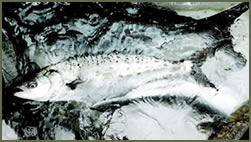Maintaining
fishing access for future generations
Kahawai Challenge team
December
2007
|
Kahawai
Legal Challenge Update New Zealand Fishing News
January 2008
edition |
|
Hugh
Barr of Wellington wants all New Zealanders to enjoy the
opportunity to go down to the sea and fish for food.
|
| This
was his main motivation for sending a $1000 contribution
to the Kahawai Challenge Fund. This is to assist the NZ
Big Game and Recreational Fishing Councils defend the High
Court’s kahawai decision against the appeal from the
fishing industry.
Although
Hugh does not fish often, he supports Justice Harrison’s
judgment that confirmed sustainability is the bottom line
and that fisheries must be managed to enable people to provide
for their wellbeing. |
|
“The
team defending the common law right of every New Zealander to
fish has to be given every encouragement. They are certainly not
getting that from the ministry of commercial fisheries.”
High
Court ruling
The High
Court decision has big implications. The principles in that case
relate to all fisheries management decisions. Fisheries such as
kahawai, snapper, shellfish and crayfish have always been traditional
food sources until the advent of large-scale commercial fishing
operations.
“It’s important we maintain access to these important
fisheries for future generations,” said Hugh.

|
Anticipation is growing
as the Wellington Appeal Court hearing draws closer. February
26th and 27th have been set aside to hear the defence of
the case lead by the NZBGFC and supported by other non-commercial
fishing representative organisations.
The irony is that the original case, taken by amateur fishers,
was against the Minister of Fisheries’ 2004 and 2005
allocation decisions for kahawai yet it is industry who
is challenging the judgment. |
Both the Minister and his Ministry have accepted the High Court
decision but commercial fishers have not.
Sanford Limited, Sealord Group Limited and Pelagic & Tuna
NZ Limited filed notice of their appeal in April this year - barely
a month after Justice Harrison ruled that the Minister, when making
decisions, could set the commercial catch limit at zero but not
the allowance for recreational fishers. “In that sense non-commercial
interests, both Maori and recreational, must be provided for where
they exist. The same does not apply for commercial interests.”
The KLC team is vigorously defending the judgment, considered
a turning point that will enable the enhancement of fisheries
to previous abundance levels and also provide for the next generation’s
wellbeing.
Support from people such as Hugh makes the effort so worthwhile.
Protecting
your fishing rights
The legal
representation costs alone will be at least $80,000. If you want
to contribute to this advocacy that seeks to protect your right
to fish for food please do one of the following:



